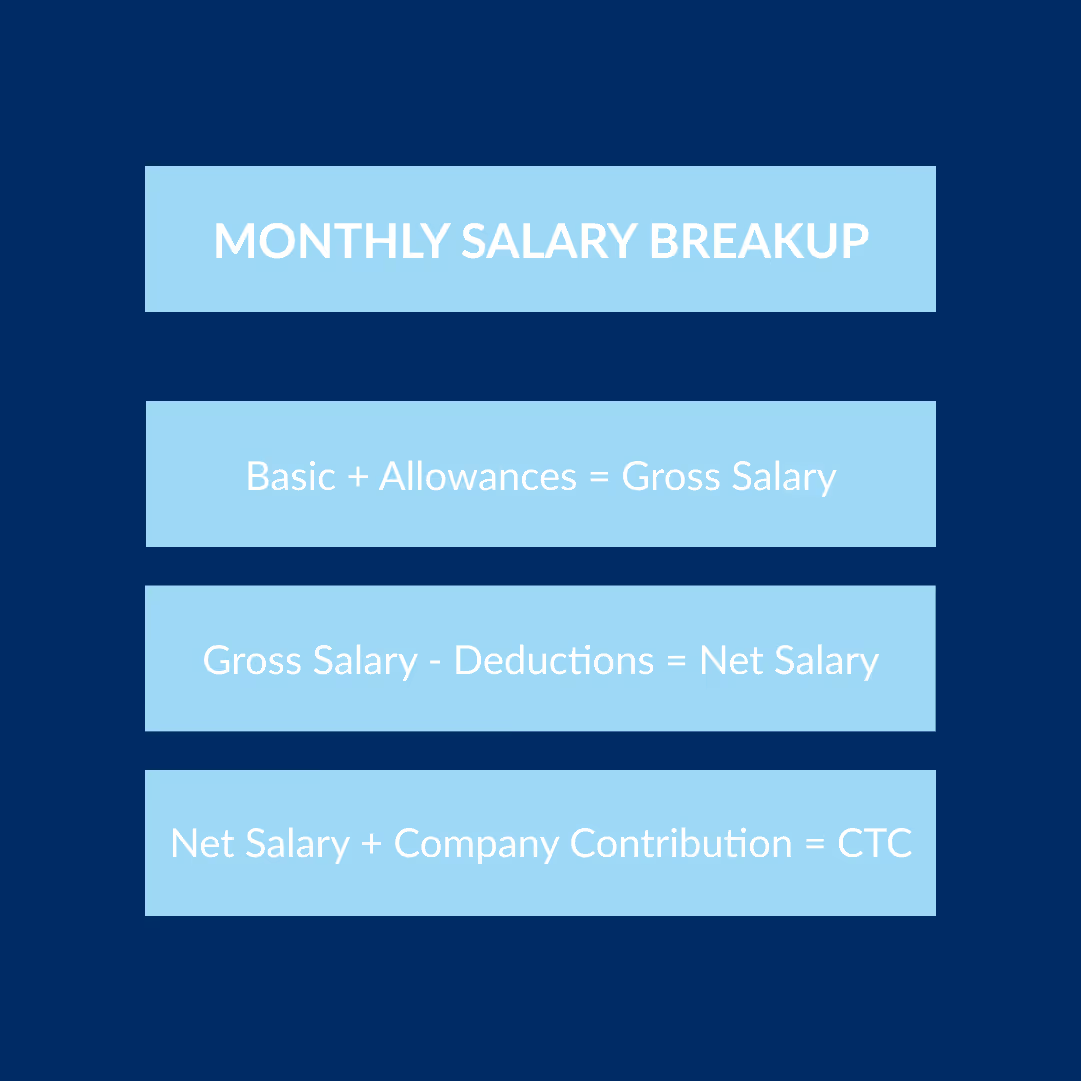What is Basic pay?
Basic salary or basic pay is the amount agreed upon by an employer and employee excluding overtime or any other extra compensation.
What are the components of basic pay?
Components of basic pay typically include:
- Basic Salary: The fixed component of the salary.
- House Rent Allowance (HRA): Provided for housing expenses.
- Dearness Allowance (DA): To offset the cost of living.
- Conveyance Allowance: For travel expenses.
- Medical Allowance: For medical expenses.These components form the foundation of an employee's earnings and benefits, ensuring a comprehensive compensation package.
How to calculate basic pay from CTC?
Cost to Company (CTC) is the total amount that a company spends on an employee directly or indirectly. CTC refers to the total salary package of the employee. It is inclusive of all monthly components such as basic pay, reimbursements, various allowances, etc. and all annual components such as gratuity, annual variable pay, annual bonus, etc. In order to carry out the basic pay calculations, one needs to subtract the allowance from the CTC, also called as gross pay.

What is basic salary percentage?
Usually, the basic salary is 40% to 60% of CTC (Cost to Company). The statutory components: bonus, PF, gratuity and other benefits are determined based on the basic salary. An increase or decrease in the basic salary calculations can affect the employee’s CTC.
How do I calculate basic salary percentage?
The basic salary percentage is calculated by dividing basic salary to the gross salary then multiplied by 100.
How to calculate total salary from basic pay?
Basic salary is the base income of any individual/entity. To calculate the total salary from basic pay, add all applicable allowances and benefits to the basic pay, and then subtract any deductions. The formula is:
Total Salary=Basic Pay+ HRA+ Conveyance Allowance+ Medical Allowance+ Other Allowances− (Deductions)

What is the difference between basic salary and gross salary?
Basic salary is the base income of any individual, the fixed part of the overall compensation package. The basic salary depends not only on the employee’s designation but also on the industry in which the employee is currently working.
Gross salary, however, is the amount computed by adding the basic salary and allowances, deducing the taxes and other deductions. Gross includes bonuses, overtime pay, holiday pay, etc.
Basic salary is the amount agreed upon by an employer and employee excluding overtime or any other extra compensation. Gross salary, on the other hand, is the amount paid before tax or other deductions but includes overtime pay and bonuses.
To summarize, gross salary is the addition of Basic Salary, Contribution to Pension/Provident fund, Overtime & Bonus, and House Rent Allowance, Travel Allowance, Children Education Allowance, and other similar allowances.
What is the difference between base salary and basic salary?
The base salary is a subcategory of the basic salary, referring to the initial amount of the basic salary range which is given to the employee in the beginning. Simply put, the basic salary usually has a range, and the value in the range is increased over some fixed, incremental periods. The start of this incremental period is always considered as the base salary.
Basic salary is the total amount (before any deductions) paid to employees plus the allowances. It is a fixed amount that is paid to employees by their employers in return for the work performed. The base salary does not include bonuses, benefits or any other kind of compensation from employers, it is the core salary of an employee.
It is the fixed part of the compensation structure of any employee and generally depends on his or her designation. The basic salary may increase every year if the employee is appointed on a full-time basis.
What is the difference between basic pay and net pay?
Even though basic salary does not include any of the deductions made, net pay is something that the employee takes home after all the required deductions are cut.
Net salary (which is also referred to as the Take-Home Salary) can be calculated by initially adding the basic salary and allowances, and then deducing the income tax, EPF and professional tax from it. The net salary will always be less than the gross salary based on mandatory and voluntary payroll deductions.
Is the basic salary taxable?
Yes, the basic salary is fully taxable. All the employee contracts include the exact percentage of salary that will be taxed. This, however, may turn out to be a loophole in the realm of basic salaries because the basic salary doesn’t include additional bonuses like overtime pay, affecting the total annual salary.
It also does not include federal income tax, medicare tax, and social security tax. As the basic salary doesn’t include these taxes, employees will receive less than their annual basic salary indicated in the contract.
FAQ's
How to calculate the total salary from basic pay?
To calculate the total salary from basic pay, add allowances (like HRA, DA, and other benefits) to the basic pay. For example, if the basic pay is $1,000 and allowances total $500, the total salary is $1,500.
How to calculate basic pay from CTC?
To calculate the basic pay from the Cost to Company (CTC), subtract the sum of benefits and bonuses from the CTC. For instance, if the CTC is $50,000 and benefits are $10,000, the basic pay might be around $40,000, depending on the company's salary structure.
How to calculate basic salary from pay scale?
To calculate the basic salary from a pay scale, identify the grade pay and other components defined in the pay scale. For example, if the pay scale is 10,000-500-15,000, the basic salary starts at $10,000 and increments by $500 annually until it reaches $15,000.














































.avif)